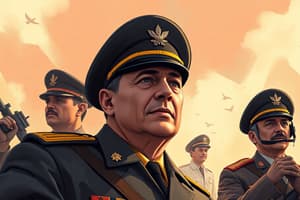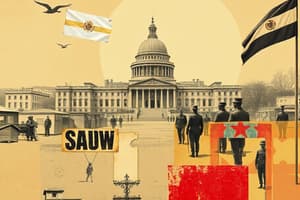Podcast
Questions and Answers
Juan Domingo Perón fue presidente de Argentina desde 1955 hasta 1962.
Juan Domingo Perón fue presidente de Argentina desde 1955 hasta 1962.
False (B)
El primer golpe militar en Argentina ocurrió en 1943 contra el presidente Ramón Castillo.
El primer golpe militar en Argentina ocurrió en 1943 contra el presidente Ramón Castillo.
True (A)
Juan Domingo Perón implementó políticas para abordar las necesidades de la clase alta en Argentina.
Juan Domingo Perón implementó políticas para abordar las necesidades de la clase alta en Argentina.
False (B)
La Revolución Libertadora en 1955 llevó al exilio de Juan Domingo Perón y al establecimiento de una dictadura militar en Argentina.
La Revolución Libertadora en 1955 llevó al exilio de Juan Domingo Perón y al establecimiento de una dictadura militar en Argentina.
Juan Domingo Perón fue acusado de autoritarismo y de utilizar el poder estatal para suprimir la oposición.
Juan Domingo Perón fue acusado de autoritarismo y de utilizar el poder estatal para suprimir la oposición.
Eva Perón fue la esposa de Juan Domingo Perón y sirvió como Primera Dama de Argentina desde 1946 hasta 1952.
Eva Perón fue la esposa de Juan Domingo Perón y sirvió como Primera Dama de Argentina desde 1946 hasta 1952.
Eva Perón estableció la Fundación Eva Perón para brindar asistencia a los necesitados.
Eva Perón estableció la Fundación Eva Perón para brindar asistencia a los necesitados.
Eva Perón fue criticada por su apoyo a los derechos de las mujeres y de los trabajadores.
Eva Perón fue criticada por su apoyo a los derechos de las mujeres y de los trabajadores.
El periodo de 1945 a 1975 en Argentina estuvo marcado por una estabilidad política y social sin enfrentamientos significativos.
El periodo de 1945 a 1975 en Argentina estuvo marcado por una estabilidad política y social sin enfrentamientos significativos.
Los críticos de Juan Domingo Perón elogiaron sus políticas dirigidas a abordar las necesidades de la clase trabajadora y reducir la desigualdad.
Los críticos de Juan Domingo Perón elogiaron sus políticas dirigidas a abordar las necesidades de la clase trabajadora y reducir la desigualdad.
Flashcards are hidden until you start studying
Study Notes
History of Argentina 1945 to 1975
Military Coups
The period from 1945 to 1975 in Argentina was marked by a series of military coups, which had a profound impact on the country's political landscape. The first coup occurred in 1943, when the military overthrew President Ramón Castillo due to his perceived pro-Axis sympathies. The coup was led by General Pedro Pablo Ramírez and installed General Edelmiro J. Farrell as the new president.
Another coup took place in 1955, driven by a coalition of military and civilians who were unhappy with the policies of President Juan Domingo Perón. This coup, known as the Revolución Libertadora, led to Perón's exile and the establishment of a military dictatorship.
Juan Domingo Perón Era
Juan Domingo Perón served as the President of Argentina from 1946 to 1955 and again from 1973 to 1974. He was a controversial figure who implemented policies that were both progressive and authoritarian. Perón was known for his populist approach, which aimed to address the needs of the working class and reduce inequality. He introduced reforms such as the creation of the National Labor Council, which aimed to regulate wages and working conditions, and the redistribution of land to peasants.
However, Perón's rule was also characterized by repression and censorship, as he sought to suppress dissent and maintain control. He was accused of authoritarianism and of using state power to suppress opposition.
Eva Perón
Eva Perón, also known as Evita, was the wife of Juan Domingo Perón and served as the First Lady of Argentina from 1946 to 1952. She was a prominent figure in her own right and played a significant role in her husband's administration. Eva Perón was known for her support of women's rights and labor rights, and she established the Eva Perón Foundation to provide assistance to the needy.
Eva Perón was also criticized for her authoritarian tendencies and her use of state power to advance her own interests. She was accused of corruption and of using her influence to manipulate political outcomes.
The period from 1945 to 1975 in Argentina was marked by instability, with frequent military coups and a series of political upheavals. Despite this, there were also periods of progress, particularly under the leadership of Juan Domingo Perón. His policies aimed to address the needs of the working class and reduce inequality, although they were also criticized for their authoritarianism. The role of Eva Perón as a prominent figure in her own right and as a supporter of women's and labor rights is also notable.
Studying That Suits You
Use AI to generate personalized quizzes and flashcards to suit your learning preferences.




